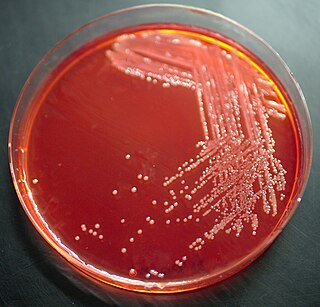
Yersinia enterocolitica is a Gram-negative, rod-shaped bacterium, belonging to the family Yersiniaceae. It is motile at temperatures of 22–29°C (72–84°F), but becomes nonmotile at normal human body temperature. Y. enterocolitica infection causes the disease yersiniosis, which is an animal-borne disease occurring in humans, as well as in a wide array of animals such as cattle, deer, pigs, and birds. Many of these animals recover from the disease and become carriers; these are potential sources of contagion despite showing no signs of disease. The bacterium infects the host by sticking to its cells using trimeric autotransporter adhesins.
Yersinia aldovae is a species of bacteria that was originally described as Group X2 Yersinia enterocolitica. Its type strain is CNY 6005. Y. aldovae has been isolated from aquatic environments and soil, but it has not been associated with animal or human illnesses.
Yersinia ruckeri is a species of Gram-negative bacteria, known for causing enteric redmouth disease in some species of fish. Strain 2396-61 is its type strain.
Yersinia bercovieri is a Gram-negative species of enteric bacteria.
Psychrobacter is a genus of Gram-negative, osmotolerant, oxidase-positive, psychrophilic or psychrotolerant, aerobic bacteria which belong to the family Moraxellaceae and the class Gammaproteobacteria. The shape is typically cocci or coccobacilli. Some of those bacteria were isolated from humans and can cause humans infections such as endocarditis and peritonitis. This genus of bacteria is able to grow at temperatures between −10 and 42 °C. Rudi Rossau found through DNA-rRNA hybridization analysis that Psychrobacter belongs to the Moraxellaceae. The first species was described by Juni and Heym. Psychrobacter occur in wide range of moist, cold saline habitats, but they also occur in warm and slightly saline habitats.
Acanthopleuribacter pedis is a Gram-negative, rod-shaped bacterium found in marine environments.
Yersinia entomophaga is a species of bacteria that was originally isolated from the diseased larvae of the New Zealand grass grub, Costelytra zealandica. The type strain is MH96. It is currently being studied for biological pest control of insect pests like the porina moth, Wiseana cervinata.

Yersinia hibernica is a species of Yersinia that was originally isolated in a pig-production environment. The type strain is CFS1934. This species has previously been misidentified as Yersinia enterocolitica and Yersinia kristensenii but it may be distinguished biochemically by lack of sucrose utilization. In addition to pig related environments, Y. hibernica has also been isolated from the feces of Rattus norvegicus and Hydrochoerus hydrochaeris.
Yersinia aleksiciae is a Gram-negative bacteria that is commonly isolated from the feces of warm-blooded animals such as humans, reindeers, and pigs. The type strain is Y159.
Yersinia massiliensis is a Gram-negative bacteria that is commonly isolated from the environment and food. The type strain is CCUG 53443.
Yersinia nurmii is a Gram-negative species of Yersinia that was originally isolated in packaged broiler meat cuts. The type strain is APN3a-c.
Yersinia pekkanenii is a Gram-negative species of Yersinia that has been isolated from water, soil, and lettuce samples. The type strain is ÅYV7.1KOH2.
Yersinia rohdei is a Gram-negative species of Yersinia that was originally isolated from the feces of humans and dogs in addition to water surfaces. The type strain is ATCC 43380. Y. rohdei strains have also been isolated from reindeer and kelp gull from the sub-Antarctica South Georgia island.
Yersinia similis is a Gram-negative bacteria species of Yersinia that resembles Yersinia pseudotuberculosis phenotypically but differs on the basis of 16S ribosomal RNA sequences. The type strain Y228 was originally isolated from a rabbit in Germany.
Yersinia vastinensis is a Gram-negative species of bacteria that has been isolated from human stools. All reported strains were isolated in France.
Yersinia rochesterensis is a Gram-negative, motile, rod-shaped bacterium that forms circular colonies and was isolated from human feces. This potentially pathogenic species has been isolated in human stools in France and in the United States where it was characterized at the Mayo Clinic. A Y. rochesterensis strain, isolated from hare and initially identified as Yersinia kristensenii, was serotyped as O:12,25.
Yersinia proxima is a Gram-negative bacterium in the family Yersiniaceae that is phylogenetically close to Yersinia enterocolitica. Members of this species has been found in human feces.
Yersinia alsatica is a Gram-negative bacterium in the family Yersiniaceae that has been isolated from human stool.
Yersinia artesiana are short Gram-negative rod bacteria in the Yersiniaceae family that have been isolated from human stool.
Yersinia canariae is a Gram-negative species of Yersinia that was isolated from a human displaying symptoms of yersiniosis. Biochemically, it is similar to Yersinia enterocolitica but whole-genome sequencing data determined it is a distinct species.

